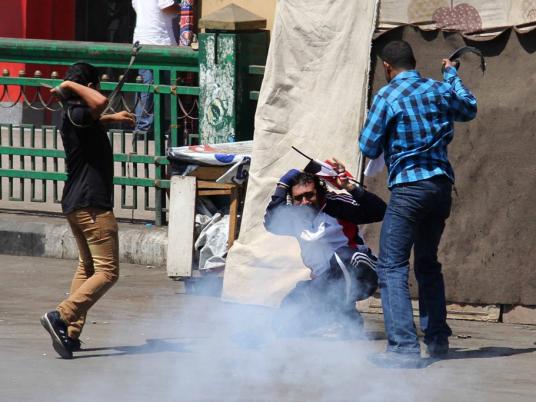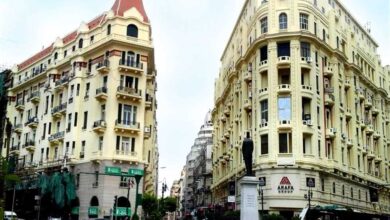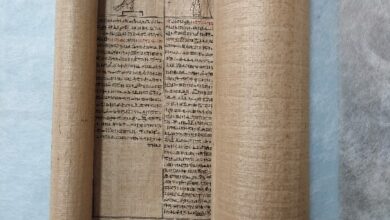
Offering no introduction, Alaa Saad marches up to an elderly street vendor and says, “let’s say you and I have conflicting viewpoints regarding a sensitive issue. Shouldn’t we try to talk our differences over, instead of reaching for each other’s throats?”
The old man, caught off guard by the 24-year-old’s question, nods cautiously. “Makes sense,” he mumbles.
Unfortunately, this level-headedness is noticeably absent from the chaotic scene referenced by Saad’s question, unfolding a few feet from the pair, and seemingly teetering on the brink of violence. It comes a few minutes later, as the sound of gunfire and a sudden hail of rocks scatters the crowd, a small number of Progressive Youth Coalition and Revolutionary Communist Party members. As they run down Talaat Harb street, some individuals scream, others shout advice (“keep to the sides, don’t run in the middle of the street!”), and a smaller number make remarks like “this is only the beginning,” and “Morsy’s got big plans for us.”
Only a few hours earlier, Tahrir square was a quiet scene, albeit far from a peaceful one. The unity which, not too long ago, the square was still being celebrated as a symbol of, has been tarnished by months of fallout which have not only left the population resentful and bitterly divided, but have served to amplify any and all differences of opinion into aggressively irreconcilable issues. As a result, the square has become somewhat of a battle arena for settling the new republic’s arguments, a breeding ground for further contention.
Immediately following noon prayers, small circles of debate manifested in the shade offered by nearby buildings and trees, clarifying the divisions within the crowd—while groups of youth freely roamed the square chanting pro-Morsy slogans and blowing horns, their detractors kept to the sidelines, complaining and arguing amongst themselves.
“What have we seen from [Morsy] so far?” shouted Ahmed Shawky Abdel Hady, a human rights lawyer who had succeeding in riling up a growing crowd from his spot in the shade. “Everytime he’s on television, all he talks about is religion, and we spent our first Ramadan with him in the dark,” he yelled, referring to the recent wave of power failures. An unidentified man joins in, also shouting “Some people still want to live like slaves, and they’re the ones who voted for Morsy.”
Across the metal sidewalk barrier dividing the two fronts, Mohamed Sherif smiles, “let them say what they want. It’s just people talking.” The 26-year-old Morsy supporter (“Morsy is Egypt,” he stresses twice during the brief interview) sees “nothing wrong with people expressing their opinion. The danger is the lies that they spread. Some people are gullible enough to fall for this nonsense.”
For Sherif, and undoubtedly many of his ideological brethren, this “nonsense” seems to constitute anything remotely negative to be said against the current president. “You can’t blame the man for not doing his job, when he hasn’t yet had a chance to do his job,” Sherif explains. “We gave Mubarak 30 years. Why should Morsy only get three months?”
“Is this the democracy that those so-called revolutionaries are calling for?” he asks, gesturing to the far smaller number huddled behind the waist-high sidewalk railing, who, at the moment were accusing the Muslim Brotherhood, through chants, of assassinating former President Anwar Sadat.
Had he ventured across the barrier, Sherif might have had his question answered by Ahmed Mohamed Abdel Aziz, an independent lawyer busy explaining to the individuals gathering around him, “we’re not against Morsy for the sake of it. We’re against these attempts at a monopoly for the benefit of the Muslim Brotherhood, or any other group.”
“No other president in the world holds as many separate powers as Morsy is trying to get his hands on,” Abdel Aziz shouted, at which point one member of the crowd challenged him, “[Field Marshall Hussein] Tantawi did.”
“Tantawi wasn’t president, sweetheart,” replies the 34-year-old lawyer.
“But this is a transitional period!”
“It shouldn’t be!”
The two argue, until, frustrated, the unidentified man concludes the debate by responding: “democracy is for the ballot box. This is the street,” and wanders off.
Tempers erupt briefly afterwards, with insults and rude hand gestures are exchanged across the railing, before a shoe comes flying from the pro-Morsy side, and an older man runs away laughing, “terrorists! Look at the terrorists!” All along the outskirts of the confusion, as the two fronts converge, inappropriate jokes are made, questions are asked (“who are they chanting for now?”), and accusations flung against everyone from media personalities, to foreign governments, to the World Bank. The first gunshot sends people running, the second sees both fronts of the crowd descend on a youth accused of having a gun. The young man is taken on a tour of the square in a bubble of violence, beaten continuously from the museum until Omar Makram mosque, where he is placed in a separate chamber with three of his captors for interrogation. The whole ordeal is scored by as many shouts of support as cries of condemnation. “What you’re doing isn’t honorable, or a sign of masculinity,” a female street vendor briefly chased the crowd yelling. “This is still Egypt, you dogs.”
Despite the relatively minimal numbers, chaos escalated over the following hour, as did the confusion. As attempts to break a fistfight failed, an elderly man approached Egypt Independent, inquiring: “Is Ramy here? Have you seen him?”
“Which Ramy, the one for Morsy, or the one against him?” asked this reporter, to which the old man replied, “the Ramy who supports the revolution.”
Shortly afterwards, a small number of protestors—the aforementioned Progressive Youth Coalition and the Revolutionary Communist Party crowd— attempting to enter Tahrir through Talaat Harb street while chanting in favor of workers and farmers’ rights, were first blocked, and then threatened by members of the pro-Morsy crowd. “Take it from me, and get out of here,” one of the latter said to this reporter, “before you regret it.” Upon hearing Egypt Independent’s explanation, the man frowns, “there’s no media here.”
A few minutes later, rocks are hurled at the Morsy opponents, much to the dismay of the curious onlookers and shopkeepers peering out from half-shuttered storefronts. “That was a small group of women and a few older men,” schoolteacher Ashraf Mohamed Hanafy frowns. “Is this how he president would want them treated? So what if they’re criticizing him? As a president, he’s a public servant. He works for us. How does it make sense then, that we can’t criticize our employee when he’s not doing the job we want him to do?”
Also showing signs of disgust was Hassan Abdel Moneim, an elderly man in a galabeya standing on a corner and announcing to anyone within earshot: “Never again. I’ve been with the Brotherhood for 30 years, and I will not vote for them next time. They’ve shown their true colors.”
“How do you think this makes me feel,” he asks Egypt Independent before answering his own question: “We’ve all been had.”
Clearly shaken by the aggression displayed towards her and her colleagues, Mona Abdel Rady, of the Central Committee of the leftist Tagammu’ Party, describes the tactics of the Morsy supporters as “pure terrorism. This country does not belong to the Muslim Brotherhood, or the Salafis, it belongs to all Egyptians. But this is all those people know—violence.”
“You only need to look around you. They’re carrying sticks and stones and rocks and knives,” she pointed out. “What do we have except these two banners and some flags? And yet, we’re the ‘troublemakers’, supposedly.”
“We will fight them. Not with their methods, but with ours,” Abdel Rady asserted. “We will fight them ideologically, and we will stand our ground, no matter how hard they try to push us back.”
Minutes later, the pro-Morsy crowd, consisting of approximately 200 individuals and led by six of them on three motorcycles, proceeded once again down Talaat Harb, cheering, chanting, waving flags, broomsticks, and V for Vendetta style masks of a Catholic anarchist, and pushed their opposition several blocks down the street, all the while singing, “through force and good manners, we’ve sent Morsy to the top.”




